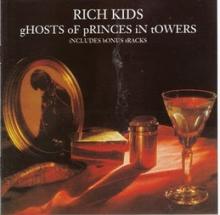The curio counting as the Rich Kids doesn’t have more than a few minutes worth of music that anyone needs to hear – and really, maybe none of it matters at all. But for all the names associated with the short lived band (Glen Matlock, Mick Jones, Midge Ure and Mick Ronson) that’s a surprise.
Of course, relative to all the stunning first wave punk stuff, which for some reason has been relegated to being regarded as effortless schlock, the 1978 Ghosts of Princes in Towers shouldn’t sound too tremendous. In a vacuum, some of its passable. But where do things exist in vacuums?
Either way, the band sprung into existence after Matlock quit the Pistols being replaced by that pillar of musical skill, Sid Vicious. No hard feelings resulted and Matlock simply threw his new ensemble together and found himself and his group featured in D.O.A., a performance video detailing some early Brit punk bands. The weird thing – in that video at least, since the song didn’t wind up on the album – is to hear Matlock do a Pistols’ song he wrote.
Part of what made that experience bizarre, though, is the expanded palette this group draws from when contrasted to the Pistols or the Clash or whichever other first wave group one’d choose for comparison. The Kids’ first single, which eventually doubled as the title for its lone album, isn’t removed from tough rock stuffs, but there’s still a healthful dose of pop style on top of it all. Matlock’s still accompanied by a spate of distorted guitar chords, but Ure’s vocals actually attempt tunefulness.
That track frequently gets referred to as power pop, but really it just seems like a mid-tempo punk track. Differences between what makes up that track and the Buzzcocks, for instance, seem minimal.
An inclusion of the Nice’s “Here Come the Nice,” is probably all the explanation anyone needs to figure out where the Rich Kids are coming from. Enough sixties’ tunefulness crops up as to make the band seem like a clutch of responsible musicians. Even discarding players’ lineages here, it’s just tough to not understand this as a punk disc, a boring one, but a punk disc nonetheless.
